- Home
- Carol Bruneau
A Circle on the Surface Page 22
A Circle on the Surface Read online
Page 22
Far less tidy than pride, shame wasn’t nearly as tough a lifeline as anger, she decided. What did shame do but hold you hostage? She had the words rehearsed, the ones that had formed themselves last evening, during that godawful sideshow in the store. Win had been nicer than she had imagined possible. Well, some people were full of surprises. The thought bolstered her. She stalked into the little bedroom.
There was Hannah, looking as if she’d been sleepwalking all night. Enman himself was kneeling at an old tea chest full of his mother’s shoes. He held up a pair of oxfords Una had politely refused.
“These should do the trick,” he was saying, “for now.” He’d already laid one of his mother’s shapeless shifts on the bed and some embarrassingly elastic-less bloomers.
“Maybe Missus has a braz tucked away somewhere that’ll work.” He pronounced it the way his mother had, to rhyme with jazz. Then he looked up. “Hello, Una.” He spoke as if it were the most normal thing in the world to be outfitting Hannah in his mother’s glad rags.
In the kitchen were a cold pot of tea and the remains of some buttered toast. Una’s backbone was the consistency of jellied chicken as she sat down. From overhead came the burble of water filling the tub. Enman ambled in but didn’t so much as glance over. He fiddled with something in the sink. A glimpse of his hand wrapped around a mug was another little kick to the stomach. His knuckles were purple.
“Don’t ask,” he said.
“Are you going to tell me what’s happened?”
“Happening.” His voice was begrudging. “I thought you’d be happy.”
“I had her here for tutoring, not to live.” Before she could grab at his wrist he made for the mudroom and went outdoors. And then Hannah was standing there, filthy feet peeping out from under her mud-splattered nightie. Upstairs, the tap burbled away.
“What, pray tell, is going on?” Una might as well have asked the stove. Hannah snivelled that she couldn’t go home again, and what would happen to Uncle? Who’d make his lunch, who’d mop up the blood? Who would tidy up after him?
“The blood?” Only then remembering the tub, she galloped upstairs. Hannah tailed her like a stray cat.
“Hush now, hush,” Una whispered. Through the window she watched Enman striding down the hill, late for work. Work. The word itself was so ordinary as to be unhinging. “Have your bath. Then you can tell me what’s going on. I guess you know as much as anybody.” She managed to put on a smile. Hannah looked as if she’d come through a hurricane, one that had swept away her every possession.
Stuffed among more of Mrs. Greene’s things was a quilted housecoat. A gift the old woman had saved for some occasion or other that never materialized. Hanging the robe on the hook, Una shut the bathroom door behind her. Containing the problem, one miniscule, temporary part of it, calmed her enough to pause and listen from the landing. But then a fresh worry arose: Suppose the girl’s never had a tub bath before. Whatever had happened, whatever Enman had or hadn’t done, he wasn’t thinking straight, he couldn’t be. Surely Isaac would see this much and send him home.
Because she needed him to come home.
If Enman was out of sorts, whose fault was it? Hannah’s muffled bursts of humming held Una’s attention as she watched for him from the window. It wasn’t hard to put two and two together: the empty bottle, a run-in with Barton Twomey. But she shuddered to think of Hannah sucked into it—worse, of herself as culprit for intiating all of this, and, by association, Twomey’s victim-to-be. Because now she would have to look out for the girl, which had not been part of the plan, showing Hannah her ABCs. Robart Inkpen kept liquor in the safe, it was a well known fact; why hadn’t Enman gone to Inkpens’ instead of Twomey’s, chosen their more respectable, less incriminating business as his source? Or maybe he had but was so upset he’d forgotten the combination. If he was upset, who was to blame for that? Now look whose lap it had all fallen into.
She gave a sharp rap on the bathroom door. “Feeling better in there? Nothing like a hot bath, is there? No one, they didn’t…hurt you, when whatever happened happened—between your uncle and Mister, was it?” How sordid, how seedy to implicate Enman, who, despite his shortcomings, was so decent. As soon as she said it she stepped away, stationing herself again at the window. Through the salt-streaked pane she glimpsed a movement in the yard below, Enman returning—please, please—or some animal, a foraging deer maybe, now out of view but stealing towards his garden?
“No, Missus. En-oh.” Cheerier than was sensible, Hannah emerged, beaming pinkly in Mrs. Greene’s housecoat. She rubbed her hands over its stiff satin. “Mister never laid a finger onto me. I guar-an-tee youse.” Marge would be spinning in her grave, virtually tilling the turf. “It wasn’t nothing much, I mean you didn’t miss nothing. Mister wanted likker, Uncle said some stuff, Mister almost kilt him, that’s all. Cross my heart, hope to die. ’Cept I don’t. Hope to. But sometimes Uncle might. Hope. For me to. But it’s okay. Mister said I ain’t going back.”
What had Enman told her?
“I guess not. If that’s what Mister says. I’ve never known him to lie,” she barely managed to whisper. Suddenly her heart was halfway up her throat, the burning replaced by her pulse. Because a creaking sound had broken the stillness downstairs—the screen door opening?
Oblivious, breezing into the spare room, Hannah admired herself in its spotted mirror.
“Pinky pinky pinky p-i-n-k! This ain’t a pig colour, is it Missus. If I can spell it can I keep it?”
“Of course—I don’t mind if you do.” Una’s stomach buckled even as her lips smiled. “Now do me a favour, will you, and stay put. Do you understand? Not a peep—promise?”
“A promise is a promise is a promise. Cross your heart and hope to die. That’s a promise. Except the dying part. I don’t want to. Do you, Missus?”
“Not just yet.”
But there was no one downstairs. The kitchen was just as Enman had left it.
She hurried back up to retrieve the disgusting nightie and lay out more clothes, leaving Hannah to pick from them while she hastened to fill the washing machine. Then she dug out some simple arithmetic to occupy the girl. The washer’s churning and thrashing calmed her enough to root through the upstairs closet for other amusements, a tangle of Marge’s abandoned sewing projects. Maybe Enman would interest Hannah in finishing them? Beside a box stuffed to overflowing with scraps of fabric was Una’s suitcase.
Inside it lay her school clothes, her little navy jacket missing its shoulder pads, donated to Enman to use as gardening knee pads. Underneath the jacket, each blouse and skirt seemed a talisman of some serviceable, sensible life. Tucked inside the case’s musty pocket was Kit’s wedding gift, a little framed picture of Gainsborough’s Blue Boy. The boy in his wrinkled satiny garb looked too twee hung against the wallpaper, Enman had decreed. “Who wants a fussy little prince presiding over their every move?”
“Over yours.” Una had said it jokingly, referring to their furtive lovemaking in his boyhood bed. She had been all too aware of his mother in the next room. Had he even guessed that her tone masked frustration?
Was this the first of the cracks that had widened into a chasm between them? It didn’t help seeing Kit’s Xs and Os on the picture’s backing, or the pencilled inscription: For Una and Enman, January 2nd, 1943. Here’s to a happy life. “Long” and “together” were conspicuously absent, any sentimentality conveyed by the boy himself: his rosy cheeks, his innocent pose, his luxurious figure swathed in chilly, satiny blue.
While Hannah figured and fussed at the kitchen table, Una busied herself, begrudgingly, putting fresh sheets on the little bed, setting aside for Hannah the clothes of Mrs. Greene’s that would fit. A blouse and undies still in tissue paper, grey socks, and a boxy grey skirt. Imagine adopting a child, she told herself, an orphan, say. Would you dress it in the same drabness it had arrived in, or in gay, jubilant colours? A lot
of people were most comfortable in what they were used to.
Downstairs, she drew a chair up to the table where Hannah worked. The girl’s wet hair curtained her face, dripping onto and puckering the scribbler’s pages. What was there to say? Una saw that she was trembling.
“I’m scared, Missus. Uncle’s my uncle. He’s all I got. I should go back. But I don’t wanna—not yet. Don’t make me, Missus. Not yet.”
“Of course you don’t.”
Feeling almost sick, she dug out the grade-five reader, paged to a story the kids had liked, and, in a haze, read aloud about a boy named Sam and his dog in Muskoka.
“Musko-ka-ko-la!” Hannah gave a quaky cheer. But then her face paled. “Oh my wordy durd, Missus. What if Uncle comes lookin’ for me?”
Hadn’t it occurred to Enman that Twomey might do just that? A chill ran up Una’s arms as she imagined a lurking presence—a flash of movement, a greyish-brown blur—ducking under the clothesline, loitering by the step. Not Twomey’s though, she told herself; he couldn’t move that fast if he tried. Whose, then?
A deeper chill prickled at the nape of her neck. Her body had its own memory, of the way the young man on the beach had placed his elbows on the sand, his palms bracketing her head, and the way his lips had curled, pronouncing, enunciating, his words.
A sailor, of course, she knew, because of his salty, diesel smell. Even as she put words into his imagined mouth—“You’re a pretty woman, a very pretty woman. Why no husband? Una Greene-like-the-colour. Why so alone and available?”—she wished she could erase them, wished she could rub out all memory of him. Like re-doing a child’s composition, replacing mistakes with corrections to produce a proper, clean version. But she didn’t want to rewrite pages, she wanted to tear them up. Because no amount of tinkering could erase what she had done.
“Missus? Maybe I should go now. Go and tell Uncle where I am. Maybe you could come with me.”
And now, was she being punished?
“No, Hannah. Not a good idea. Wait till Mister comes home, and see what he says.”
19
A fellow could do much, much worse in a boss, it dawned on Enman. Isaac didn’t bat an eye at him or at the bottle he cradled, despite his being caught red-handed removing Robart’s finest from the safe. Furthermore, Isaac could have knocked Enman over with a feather, saying to go home and stay there “till you’re more yourself, man.”
He leaned into the backyard boulder, sucking back the whiskey’s burn. No way they could see him from the house, though why it should matter, he no longer knew. The “little Twomey one” had seen his true colours, witnessed his spoiling for alcohol and a brawl. Hannah knowing his weakness was worse than having Una know, somehow. A slobbering alcoholic, a dithering drunk was what he was.
Sitting on the ground, he flexed his legs. Wet soaked through his pants and shoes, but who cared? Not him. Not only had he followed in Cleary’s footsteps, but he had turned into his father. If Una had used him, it was no one’s fault but his own. Along with the liquor, the sad truth stung his gullet, trickling down.
Their combined burn was only sharpened by the sight of his marigolds become, overnight, an orange mush. “Okay you little beggars….” Yanking them out, roots and all, he fired them one by one at the fence, to join the Javexed knotweed. Chubby, off his rope for once, made his way through a gap to come and paw for a treat.
“Sorry, buddy, don’t even have a stick for you, do I.” If he had his damn fiddle he could’ve tossed that.
Lying down on the sodden grass, he took a deep, scalding swallow. Chubby nudged his wrist. Never mind who might be watching. Win would be one of them—she had known all along he was a loser, a chicken-hearted, lily-livered loser, and didn’t he and his wife, foolish as a character from Looney Tunes, deserve each other?
For better or for worse, maybe they did.
Chubby slobbered over his hand, then gave his chin a lick. It was just enough to coax him to his feet. Swinging the bottle, he swayed a little, fell. Finding himself engulfed in goutweed grown suddenly rampant, he knelt to tackle the stuff—“you goddamn little buggers”—its slimy stems adding green to his bruises. “You goddamn little bugger,” he cursed with each tug. “I guess we’re all in a fine pickle, Chub.” The dog cocked its ears.
Downing the dregs, he ran his good hand over Chubby’s snout.
This cursed summer. Where was September, that month with its whiskey-golden glow? He clasped the empty bottle to his chest—oh, like a light, like a burning candle next to his heart!—then fired it as hard as he could towards the privy. A tune started up in the back of his mind—the Vera Lynn one they played every waking minute on the radio: “We’ll Meet Again.” Maybe Steady Hill should try a rendition of that? He smirked at the thought as Chubby rolled around belly-up at his feet, scratching his mangy back.
He tried humming Dvořák, the humble, gently hopeful part, but the melody eluded him. A tune from Prokofiev kept cutting in, the Russian’s happy ending to Romeo and Juliet.
When August ended, so would life as he knew it. What would he do? How would he cope, especially now, having the girl under his wing and, God knows, Twomey out for blood? Maybe teaching would make Una “more herself” again. But the prospect of this only made it harder to imagine her gone.
In the fuzzy distance a patch of blue appeared above the barrens, and the timid glimmer of sunshine. Rubbing Chubby’s chest, he imagined a full bottle, whiskey the same steeped amber as bog water. The dog panted and smiled its doggy smile, sitting on its haunches. Then Tippy reared from under a rose bush and Chubby was off—the way that cat moved, you’d never guess it had three legs. Or maybe it was just that his own legs felt thick as the jam Ma had once overboiled, engrossed in praying the Divine Mercy Chaplet. His head felt that way too, the whiskey’s heat having flared up through his ears and under the roof of his skull. Such a slow fuzzy burr that it didn’t register, not at first, the shout coming from the house: his name being yelped.
Forcing his weight onto his elbows, from behind a kind of veil he watched Hannah waving and hollering from the stoop. His arm, log-heavy, felt asleep the way his legs did, but he managed to wave back. The thought crept up with a mortifying clarity—I’m no better than a Barton Twomey—then struck as hard and mercilessly as if Hannah had marched out and slugged him. For God’s sake, Cleary, if you must go boozing, don’t let people see you at it, especially not that poor girl: Ma’s pained salvo blazed its way through his head, too late, of course. Hannah disappeared inside. The only thing for it was to get up and onto his pins, and see what Hannah was yelling about.
He managed to get behind the boulder in time to bring up. As he hunched and gagged, a cantata filled his head, a slurry of voices living and dead—Una’s, Ma’s, the old man’s and even Hubley Hill’s—all singing the same line: let it go, fella, get over it, whatever it is. In his imagination, he raised the full bottle that existed only in his mind, and biffed it after the very real empty he had pitched toward the outhouse. He imagined the tinkle of glass shattering over rock. It’s never too late, my boy, he heard Ma say. And then he imagined pure gold liquor seeping into the chokeweed, reaching down through the pitifully thin soil to water the graves of Dinky toys, anointing weeds and rust and the beaten paths of all and any who had passed this way—such ordinary, unforgiving ground, it was, fairly worthless and, in its inscrutable way, heartless. Why care about it, why let himself be tied to it as his forebearers had been? They had had little choice but to be. He had a choice, sort of. But having a choice made him feel even more tied to the spot, solid ground set against human fickleness. The waffling of people’s minds and hearts, he thought, as Vera Lynn—songbird of the Forces—crooned from somewhere, wispy strains of “We’ll Meet Again.” It was coming from the house, the song that had played on the radio New Year’s Eve. It wasn’t Ma singing. For the briefest flash, swaying towards it, he imagined the voice was his dear, confounding
Una’s.
Seizing his wrist, Hannah dragged him into the front room. For the strangest gut-wrenching second it was Ma he saw sitting on the sofa. “I see you’re being well taken care of, Enman.” It was not Ma, of course, not Ma at all, but Mrs. Finck. The woman made an effort to stand, holding out a veiny, speckled hand. “Two ladies looking after you—a bloody harem. Your ma’d be some pleased.”
A queer look passed over Iris’s face. Was her poor old husband reminding her of ancient jealousies? Maybe Lester, Cleary, and Ma were on the other side of the veil, all being friends.
Backing up, the old doll sat and arranged herself awkwardly on the upholstery. Her lumpen feet in oversize shoes dangled above the floor—a sight she was, even in his state he noticed, and had to stifle a laugh. It was kind of amazing that Una had—he supposed Una had—invited her in.
“Ahem,” Iris Finck cleared her throat and the fog in his head thinned, making itself as scarce as the girl. Una was nowhere in sight, and Hannah had wasted no time clearing out.
“Shy, are they—your ladies. Anyways. Enough pussyfooting around, see, before I collapse of nerves. All right, like Lester says, it’s usually best to just spit things out, isn’t it.” Iris fixed him with eyes as rheumy as they’d seemed eyeing Lester’s accordion that time in the snow.
He hadn’t a jeezly clue what she could possibly be here for, unless it was to express, very belatedly, condolences about Ma.
“You want to, um, fill me in, Iris?”

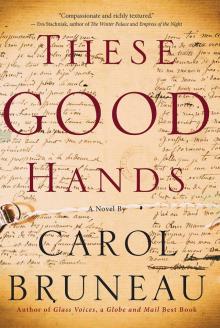 These Good Hands
These Good Hands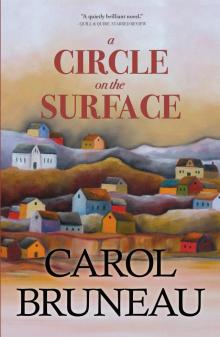 A Circle on the Surface
A Circle on the Surface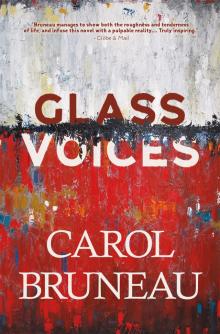 Glass Voices
Glass Voices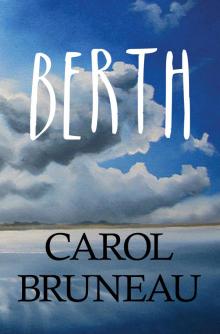 Berth
Berth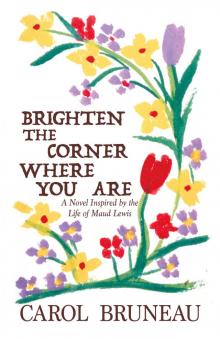 Brighten the Corner Where You Are
Brighten the Corner Where You Are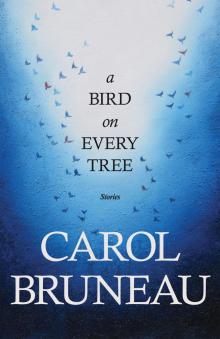 A bird on every tree
A bird on every tree